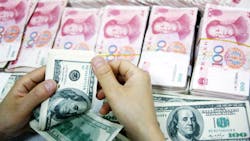China Currency Devaluation 'Too Early to Judge,' Says US
WASHINGTON—The United States said it would be premature to assess China's surprise yuan devaluation Tuesday, warning than any reversal in Chinese reforms would be "troubling."
In the first reaction from the Obama administration to the People's Bank of China's nearly 2% cut in the yuan's reference rate to the dollar, the Treasury said it had pressed China for a more flexible exchange rate that reflects the market.
"While it is too early to judge the full implications of the change in the PBOC reference rate, China has indicated that the changes announced today are another step in its move to a more market-determined exchange rate," the Treasury said in a brief statement.
"Any reversal in reforms would be a troubling development."
The Treasury said it would continue to monitor how the changes are implemented and to press China on the pace of reform.
This includes additional measures to transition to a market-oriented exchange rate and "its stated desire to move towards an economy that is more dependent on domestic demand, which is in China and America's best interests."
US officials have long accused the Chinese government of keeping the currency, also known as the renminbi, undervalued to make Chinese exports cheaper and gain an unfair trade advantage.
The massive US goods trade deficit with China exceeded $31 billion in June. The sharp depreciation of the yuan Tuesday could widen that politically sensitive gap.
The devaluation raised speculation that the Chinese economy's slowdown is deeper than had been expected and its government is trying to rev up exports.
Treasury Secretary Jacob Lew said last month that the slowdown and Chinese stock market turmoil would be a litmus test for China's commitment to reform.
Lew, speaking at the Brookings Institution, said that China has shown a "quite determined commitment" over the last two years to a reform agenda.
"The question isn't their commitment to the goal, the question is the pace at which they implemented it," he said. "I hope this is not something that slows down the pace of reform."
Copyright Agence France-Presse, 2015
About the Author
Agence France-Presse
Copyright Agence France-Presse, 2002-2025. AFP text, photos, graphics and logos shall not be reproduced, published, broadcast, rewritten for broadcast or publication or redistributed directly or indirectly in any medium. AFP shall not be held liable for any delays, inaccuracies, errors or omissions in any AFP content, or for any actions taken in consequence.
